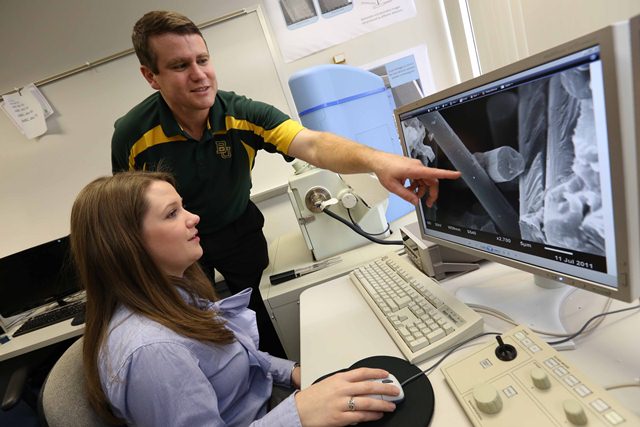Master's Candidate Sarah Stair Receives Scholarship for Work on Non-Destructive Characterization of Materials

Sarah Stair and David Jack, Ph.D.
Follow us on Twitter: @BaylorUMediaCom
Media contact: Tonya Lewis, (254) 710-4656
WACO, Texas (Sept. 26, 2014) - Though they may be fun to test and cool to watch, crash testing with black and yellow dummies as passengers could be no more, thanks to work being done by Sarah Stair, a master's candidate for mechanical engineering in the Baylor School of Engineering and Computer Science.
The organizing committee for the Society of Plastics Engineers' (SPE) Automotive Composites Conference & Exhibition (ACCE) has awarded Stair, a $2,000 scholarship for the 2013-2014 school year for her topic, "Non-Destructive Characterization of Ply Orientation and Ply Type of Carbon Fiber Reinforced Laminates." Out of the more than 60 applicants, Stair's topic was chosen for having the greatest potential impact on ground transportation.
Stair has developed a new way to test the strength of transportation materials without having to actually bend the material to its breaking point.
David Jack, Ph.D., professor of mechanical engineering in Baylor University's College of Engineering and Computer Science, has known Stair for three years as both her professor and advisor. The primary reason Stair stood out, Jack said, was her topic of choice.
"The thing that she's been working on in the lab for the last year or so . . . is quite novel and is very interesting to several communities dealing with composites," he said. "If I'm a car company or a plane company and I'm going to break a plane, that's a lot of money. They can't afford to test the car anymore."
Originally intended solely for the aerospace industry, Stair found that the project could be extended to other transportation industries. Not only that, she said, but "based on the research we have performed to date, our system is approximately 90-95 percent accurate, and we are working to improve its accuracy."
Past winners of the award are primarily from the top 10 engineering schools in the country, Jack said, all of which are decades old. Baylor's College of Engineering and Computer Sciences, on the other hand, has only offered master's programs since 2004.
"When you look at the age of these other programs, we're a baby," Jack said. "It's a good indication of the direction that Baylor's going; that we're getting to be more competitive."
Stair said she was grateful for Jack, calling him "instrumental in my success."
"I have been blessed with many supportive professors while at Baylor University, especially in the engineering department," she said. "They have given me opportunities to learn, lead and develop skills."
Stair graduated magna cum laude with a bachelor's degree in mechanical engineering and a minor in mathematics from Baylor University last year. She continued working on her master's degree in mechanical engineering at Baylor and currently is in her second year of the program.
"Part of this award will go towards funding my return trip to present my research results at next year's conference," Stair said.
The annual SPE ACCE is held in Detroit, but draws more than 700 speakers, exhibitors, sponsors and attendees from around the world. The purpose of the event is to provide an environment dedicated solely to discussion and networking about advances in the transportation composites. website or call (248) 244-8993. —>
by Rachel Miller, student newswriter, (254) 710-6805
ABOUT BAYLOR UNIVERSITY
Baylor University is a private Christian university and a nationally ranked research institution, characterized as having "high research activity" by the Carnegie Foundation for the Advancement of Teaching. The university provides a vibrant campus community for approximately 15,000 students by blending interdisciplinary research with an international reputation for educational excellence and a faculty commitment to teaching and scholarship. Chartered in 1845 by the Republic of Texas through the efforts of Baptist pioneers, Baylor is the oldest continually operating university in Texas. Located in Waco, Baylor welcomes students from all 50 states and more than 80 countries to study a broad range of degrees among its 11 nationally recognized academic divisions. Baylor sponsors 19 varsity athletic teams and is a founding member of the Big 12 Conference.
ABOUT THE SCHOOL OF ENGINEERING AND COMPUTER SCIENCE
With more than 10 percent of Baylor University's freshman class pursuing major courses of study in the School of Engineering and Computer Science (ECS), the focus remains on preparing graduates for professional practice and responsible leadership with a Christian world view. ECS majors include bioinformatics, computer science, electrical and computer engineering, general engineering, and mechanical engineering. Among ECS graduate programs are master of science degrees in all disciplines, a Ph.D. in electrical and computer engineering, and several dual degree programs. The Teal Residential College for Engineering and Computer Science, in which students and faculty live, fosters the pursuit of wisdom, academic excellence, and meaningful relationships for the development of diverse, innovative leaders.